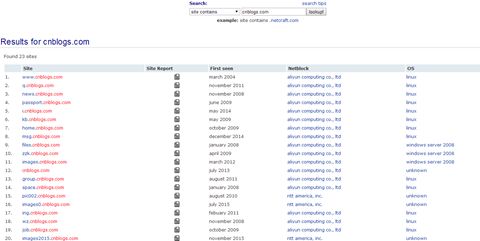★Kali信息收集~3.子域名系列
★3.1Netcraft :子域名查询
![]() 官网:http://searchdns.netcraft.com/
官网:http://searchdns.netcraft.com/
输入要查询的域名,即可得知子域名
3.2Fierce :子域名查询
-
概述:
fierce 是使用多种技术来扫描目标主机IP地址和主机名的一个DNS服务器枚举工具。运用递归的方式来工作。它的工作原理是先通过查询本地DNS服务器来查找目标DNS服务器,然后使用目标DNS服务器来查找子域名。fierce的主要特点就是可以用来定位独立IP空间对应域名和主机名。
-
参数:
root@Kali:/home/dnt# fierce -h
fierce.pl (C) Copywrite 2006,2007 - By RSnake at http://ha.ckers.org/fierce/
Usage: perl fierce.pl [-dns example.com] [OPTIONS]
Overview:
Fierce is a semi-lightweight scanner that helps locate non-contiguous
IP space and hostnames against specified domains. It's really meant
as a pre-cursor to nmap, unicornscan, nessus, nikto, etc, since all
of those require that you already know what IP space you are looking
for. This does not perform exploitation and does not scan the whole
internet indiscriminately. It is meant specifically to locate likely
targets both inside and outside a corporate network. Because it uses
DNS primarily you will often find mis-configured networks that leak
internal address space. That's especially useful in targeted malware.
Options:
-connect Attempt to make http connections to any non RFC1918
(public) addresses. This will output the return headers but
be warned, this could take a long time against a company with
many targets, depending on network/machine lag. I wouldn't
recommend doing this unless it's a small company or you have a
lot of free time on your hands (could take hours-days).
Inside the file specified the text "Host:\n" will be replaced
by the host specified. Usage:
perl fierce.pl -dns example.com -connect headers.txt
-delay The number of seconds to wait between lookups.
-dns The domain you would like scanned.
-dnsfile Use DNS servers provided by a file (one per line) for
reverse lookups (brute force).
-dnsserver Use a particular DNS server for reverse lookups
(probably should be the DNS server of the target). Fierce
uses your DNS server for the initial SOA query and then uses
the target's DNS server for all additional queries by default.
-file A file you would like to output to be logged to.
-fulloutput When combined with -connect this will output everything
the webserver sends back, not just the HTTP headers.
-help This screen.
-nopattern Don't use a search pattern when looking for nearby
hosts. Instead dump everything. This is really noisy but
is useful for finding other domains that spammers might be
using. It will also give you lots of false positives,
especially on large domains.
-range Scan an internal IP range (must be combined with
-dnsserver). Note, that this does not support a pattern
and will simply output anything it finds. Usage:
perl fierce.pl -range 111.222.333.0-255 -dnsserver ns1.example.co
-search Search list. When fierce attempts to traverse up and
down ipspace it may encounter other servers within other
domains that may belong to the same company. If you supply a
comma delimited list to fierce it will report anything found.
This is especially useful if the corporate servers are named
different from the public facing website. Usage:
perl fierce.pl -dns examplecompany.com -search corpcompany,blahcompany
Note that using search could also greatly expand the number of
hosts found, as it will continue to traverse once it locates
servers that you specified in your search list. The more the
better.
-suppress Suppress all TTY output (when combined with -file).
-tcptimeout Specify a different timeout (default 10 seconds). You
may want to increase this if the DNS server you are querying
is slow or has a lot of network lag.
-threads Specify how many threads to use while scanning (default
is single threaded).
-traverse Specify a number of IPs above and below whatever IP you
have found to look for nearby IPs. Default is 5 above and
below. Traverse will not move into other C blocks.
-version Output the version number.
-wide Scan the entire class C after finding any matching
hostnames in that class C. This generates a lot more traffic
but can uncover a lot more information.
-wordlist Use a seperate wordlist (one word per line). Usage:
perl fierce.pl -dns examplecompany.com -wordlist dictionary.txt
-
实例: threads 是线程数,可以自己指定
 root@Kali:/home/dnt# fierce -dns cnblogs.com -threads 100
root@Kali:/home/dnt# fierce -dns cnblogs.com -threads 100Trying zone transfer first...
Unsuccessful in zone transfer (it was worth a shot)
Okay, trying the good old fashioned way... brute force
Checking for wildcard DNS...
** Found 99901599299.cnblogs.com at 42.121.252.58.
** High probability of wildcard DNS.
Now performing 2280 test(s)...
120.26.70.206 files.cnblogs.com
42.121.129.234 images.cnblogs.com
223.6.251.45 group.cnblogs.com
223.6.251.45 home.cnblogs.com
42.121.129.234 download.cnblogs.com
221.181.200.235 cdn.cnblogs.com
42.121.131.85 mail.cnblogs.com
42.121.129.234 downloads.cnblogs.com
223.6.251.45 news.cnblogs.com
223.6.251.45 ad.cnblogs.com
42.121.254.229 p.cnblogs.com
。。。。。。。。
